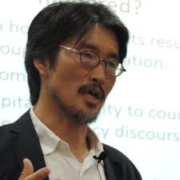The internationalization of education is a topic that receives plenty of buzz these days. Many students easily move across boarders to learn outside of their home country. Branch campuses by Western universities are popping up around the world. And Education businesses operate globally, selling educational materials and services to any school will to purchase them.
But can the phenomenon of international education exist within sites where there these practices don’t clearly exists?
My guest today is Phan Le Ha. She is a Professor in the College of Education, University of Hawai’i. Professor Phan has a forthcoming book entitled Transnational Education Crossing ‘the West’ and ‘Asia’: Adjusted Desire, Transformative Mediocrity, and Neo-colonial Disguise. Today Professor Phan and I discuss parts of this book, particularly related the the dominance of the English language in many Asia countries.
Professor Phan is currently developing a new interest in engaging with the arts, the media and the digital world to produce multimodal multidisciplinary scholarship and to push research and knowledge production into new directions. Her youtube channel can be found here
Citation: Ha Le Phan, interview with Will Brehm, FreshEd, 19, podcast audio, March 14, 2016. https://freshedpodcast.com/phanleha/
Will Brehm 1:31
Phan Le Ha, welcome to FreshEd.
Phan Le Ha 1:33
Hello, hello from Honolulu.
Will Brehm 1:38
You have a forthcoming book that looks at transnational education. And this topic is quite popular these days. Transnational education is almost a buzzword. Could you begin this conversation by telling me, what do you mean by the term transnational education?
Phan Le Ha 1:59
Okay, yes. Actually, it is interesting when you mentioned that. It is a buzzword and so much has been done in relation to the topic. But I actually I want to bring a different perspective. Yes, on the one hand, while there has been so much written about transnational education, but my observation is that much hasn’t really -or I would say, doesn’t have much to do with scholarship.
Will Brehm 2:42
What does it have to do with?
Phan Le Ha 2:44
Scholarship. It means that there is a missing part of rigor and conceptualization not so much about the term but about what is going on in that very transnational space? So, let’s talk a little bit about definition. There are many, many different ways to understand transnational education. And probably up to now, I would say that one common understanding of transnational education or TNE often refers to any educational programs that have students from a country other than the one in which the awarding institution is based. And normally, there are three major modes of delivery in TNE namely, distance education, partner support delivery, and a branch campus. And the movement of programs across borders through all forms of delivery is perhaps one of the most significant aspects of TNE these days. And if the movement of people was emphasized in the initial stage of TNE, then the movement of programs is now the key idea. However, what is covered in my book really is extended to certain forms of exchange programs and short study tour programs where students can also be placed in a host institution, but they may not necessarily get credits for the exchange or study tour period. And, in addition to the above, I was the understandings of TNE, I really want to highlight and argue that English-medium programs and courses offered by local institutions can also be seen as a form of TNE although the students are not earning degrees or qualifications from any overseas universities. Why do I say that? In creating their own programs, many of these institutions often draw on existing programs, materials, course syllabi, and lectures from other English-medium programs developed elsewhere. They also invite academics from other institutions to offer advice concerning the shape and content of their programs and curriculum. And in many ways, some institutions also contract a group of international academics and advisors to develop English-medium programs that are perceived to be internationally competitive. And also, many universities in Asia, for example, employ international academics who can teach and do research as well as to develop courses in English and to raise to publish in English to meet the needs of an international student body. And I can tell you many, many examples.
Will Brehm 6:14
And I think we’ll get to the examples. But I’d like to just clarify. I guess when I hear the word transnational, I think something that is either above the national or not necessarily between two, inter-national. So, what’s the difference between transnational education and international education?
Phan Le Ha 6:40
Oh. I think that’s a great question. Actually, I haven’t really thought much about it. But I don’t necessarily think that they -probably, the term international probably had been coined first, and then trans is on spike a bit. But normally, for a long time, transnational often referred to the movement of people and then the movement of ideas that involve, somehow, at least two elements. However, as I have said earlier, many universities or programs or courses based in Asia already embody in themselves the trans or international aspect because they tend to borrow, or I would say, influence, or they learn from ideas that have already been developed somewhere else. So, you don’t have to be mobile to be transnational or to be international. I don’t know if you get what I mean.
Will Brehm 8:27
So, you can be living in Cambodia, or Vietnam, and never leave your country but still experience transnational education? Is that what you’re saying?
Phan Le Ha 8:38
Right. And even if you live in Cambodia, and if the university you are attending doesn’t necessarily have any partnership with an international partner country or institution, but the programs you are taking can be as transnational or international as any programs developed in a joint partnership somewhere else.
Will Brehm 9:14
Can you explain that further? Maybe through an example.
Phan Le Ha 9:17
Okay. So, in the context of Vietnam, for example, we have something called The Advanced Program Initiative, launched by Vietnam’s Ministry of Education and Training in 2005. In which, and I think probably up to now, 23 Vietnamese universities have worked with a number of American universities to create programs for Vietnamese universities using so-called American modern methodologies, curricular, and instructional practices. And English, in principle has been used as a medium of instruction in these programs. And students attending these programs may not or probably are not given or offered degrees from US universities. But I will say that the nature or the development of these programs could be seen as a good example of transnational.
Will Brehm 10:34
And why would ministries and universities in say, for example, Vietnam, see this sort of internationalization as desirable?
Phan Le Ha 10:48
I think it is not just Vietnam, probably every way.
Will Brehm 10:54
Of course, of course. It was just one example out of many different countries. But why would certain countries find it desirable to internationalize their universities, and governments promoting such processes?
Phan Le Ha 11:10
Yeah. Internationalization has been probably incorporated in the language of all kinds of reform, whether it is in relation to education or human resources. So, it has become an indispensable part of a nation’s vision. And also, another way to look at it is the processes of globalization. And so, when, let’s say Vietnam, looks at its neighboring countries, Thailand, or Malaysia, or Singapore, and picturing those countries as being so internationalized, then that created an internal desire to want to be like them in a way. So, I think that desire is both internally driven, as well as informed by what probably I will discuss later as a form of a traveling phenomenon. So, internationalization, for me, is a traveling policy, a traveling practice, a traveling discourse,
Will Brehm 12:39
And what do you mean by traveling?
Phan Le Ha 12:41
Okay. So, for example, when something travels, probably, we can look at it in different ways. Whether it travels freely, whether it travels without any resistance, or basically, it is just something that happens so naturally. But in the context of transnational education or internationalization, I would argue that the sense of traveling takes place in all these domains. On the one hand, it’s very much welcome because internationalization, as I said before, can be internally driven. So, Vietnam, for example, would reach out and want to learn from internationalization practices from other places. And therefore, the act of reaching out could enable internationalization practices to travel to Vietnam through different means. It probably could be enforced by policies, or different directives, or it could be incorporated in different reforms, or could also accompany expats, or be embedded in practices of institutions locally, or through partnerships with foreign institutions. So, at one level, it’s a kind of happy traveling but at another level, a traveling policy -I’m sure that you have done some work with that as well- can come from a global imposition of what might be seen as being desirable. For example, the concept of critical thinking, the concept of learner-centered education, and in what, why, and how the internationalization of education enables the widespread of critical thinking as a desirable part of higher education in many countries, for example. And so, of course, that traveling of those concepts through internationalization can be seen as highly being problematic and could come with a lot of resentment and I would say, complications, because we all know that there are many, many different ways to view learner-centered education.
It is not an unproblematic concept or approach to teaching or pedagogy. So, when such concepts travel through internationalization of education, I would say that traveling is not necessarily smooth, or of freewill. But also, with the increasing movement of ideas, and people across borders, internationalization also travels with them. And so, this way, probably we have less control in the speed and the intensity of the act of traveling itself. And so, for example, in many institutions, certain academic staff may initiate programs that very much resemble programs in another institutions overseas that they have somehow learned from, or are trying to adapt. However, other academic staff within the same institution may not agree with that, or may have never really been exposed to that kind of development of ideas or a program. And so, we could see the different ways of doing internationalization, taking place alongside and sometimes there are different forms of conversions and diversion happening because, as I said, just the different ways of looking at how delivery of ideas or delivery of what we might term internationalization is carried out.
Will Brehm 18:32
Let’s look at maybe one major area of the internationalization or the transnational education. And you’ve mentioned it a few times, it’s the prevalence of English medium instruction across many school systems in the world. So, how did English or why did English take on such a privileged role? And I find it interesting in the Southeast Asian context that English is so prevalent, yet Chinese, which is a near neighbor, is not taught as often or not given the same status, I should say.
Phan Le Ha 19:18
I think one important reason is the already availability of English in certain parts of Southeast Asia, notably, Singapore, Malaysia, and the Philippines. And as much as colonialism has been problematized and criticized in the context of transnational education, colonial ties with Britain, with the US, tend to be celebrated when an endorsement about the advantages of being able to deliver courses and programs in English is needed. So, again, as I said, the first reason might be related to the already availability of English. But also, English has been understood by many as an international language, as a lingua franca, as a world language and as a language of academic work, or advancement, or a language of intercultural and academic exchange. So, that understanding of English has been informing and driving the conceptualization, policy, practice and pedagogies of education, particularly in transnational education. And even with that understanding, it probably has created an anxiety among countries and institution, if they somehow perceive that their level of engagement with English is not intense enough. So, the sense of wanting to catch up via the medium of English is very strong. And that in itself just makes English even more desirable, more wanted.
Will Brehm 21:51
I know that in Cambodia, the desire for English is tied to economic growth and prosperity. And so, there is this discourse of, if only more students could learn English, Cambodia could participate in the global economy more and therefore would increase its mean national wage.
Phan Le Ha 22:18
Right. Definitely, economic development or economic advantage has played a role in the spread of English. But at the same time, I would say the conscious investment in English is also evident across the board.
Will Brehm 22:43
By whom?
Phan Le Ha 22:44
I mean, by governments, by policy makers, by institutions and by individuals in societies, when there are indeed many examples of so-called success in the literature that I have reviewed. Singapore has often been referred to as one of the most successful examples of internationalization of education or of transnational education. And English has always been, emphasized as Singapore’s comparative advantage. And so, even within the context of Singapore, the debate between, you know, Singlish, or speaking good English movement all play a role in positioning Singapore in what way English really shaped Singapore’s identity, and what English, who’s English, and let’s say, without the perceived good English, would Singapore still be as attractive as it has been towards international education or towards other nations as a hub for international education? So, of course, English definitely plays a very important role, I would say, in the competition as well as collaboration. A lot of collaborations have been taking place via English. And even within Southeast Asia, right. I mean, you mentioned before, like, Chinese language in Asia in general. But even within the context of Southeast Asia, we would think of Malay maybe as a lingua franca but the working language of ASEAN is English. So, when an institution from Vietnam visits an institution, let’s say, in Brunei or in Malaysia, English is often used as a medium of communication.
Will Brehm 25:18
What do you think the dominance of English does to the national cultural identity in these countries? What has your research uncovered?
Phan Le Ha 25:30
Yeah. There have been a lot of discussions about the impact of the dominance of English on questions of national and cultural identities in Asian contexts. And I think, according to my own research, as well as the already published literature on this topic, there is no one simple answer to it. Because the different countries in the region have a different historical relationship with English. And with different historical and cultural attachment to the language as well as to the many other languages available in those countries. Whether the concept of identity has been seen in a negative or positive light has been, I think, has been discussed a lot. There are different associations with English. So, at the national level, yes. There has been concern and anxiety. But when you talk to different individuals and when you’re engaged with different discussion within a society, then you can see more layers to it. So, this is from the symbolic to a more realistic. And so, identity is very complex. It’s not just something that people across the board shared. So, the national narrative of identity, in the context of internationalization of education, and in relation to English may not be shared in the same way by stakeholders, or by participants of the internationalization of education.
Will Brehm 27:43
Your new book looks at these different transnational education processes or phenomena, as they cross the “West” and “Asia”. What sort of dichotomies or what sort of crossing patterns have you uncovered?
Phan Le Ha 28:07
Okay. So, actually, alongside of my work with paying attention to transnational education contexts, I have also been working a lot in so-called English-speaking western country contexts. And I’ve identified a lot of what I would say, repeated dichotomous understandings of so-called West and Asia manifested in a series of relationships between two seemingly exclusive populations, such as Western professors, Eastern Asian students, Western methodologies, or Western learning style and teaching style, and Asian teaching and learning style. So, in other words, there have been many, I would say, generalizations, developed based on these two grand philosophies associated with the West and Asia, per se. And so, when I do more work in transnational contexts, I find probably the exact same generalizations. And so these equals generalization or stereotype or essentialization of the West and of Asia in almost every transnational context and setting, as well as in the way the sector operates, and in the way the sector has been promoted, in the way the sector asserts itself as a key development for the future. So, do you want me to talk more? Or to give you specific examples?
Will Brehm 30:51
Yeah, I think that would be very helpful.
Phan Le Ha 30:53
Okay. So, for example, what so-called Asian students in transnational education tend to be seen as lacking critical and analytical thinking and ability. And at the same time, Asian teachers employed to work in transnational programs tend to be perceived as lacking necessary knowledge and skills in comparison to their Western counterparts. So, we’ve seen that a lot repeatedly and where’s the evidence? Of course, the evidence is in how the students themselves describe their programs, describe their own teachers, and also in the way teachers themselves talk about them and talk about their colleagues. And also evident in how certain administrators talk about their own institution and the desire for improvement that they hope to be done via the West.
Will Brehm 32:26
So, are you saying that the stereotypes of the West and the East is being confirmed in the data that you’re collecting?
Phan Le Ha 32:37
Yeah, very much so.
Will Brehm 32:39
And is it more complex than that? Or is that the main finding?
Phan Le Ha 32:47
Of course, it’s a lot more complex than that. At first, I was very tempted, just to look at them as discourses but after about 10 years visiting different research sites and meeting with different groups of participants, and also attending many site observations. And then I have to ask myself, is it a real discourse or actually it’s the reality? Because at the same time, the increasing commercialization of higher education via transnational education, for example, probably has created more problems that would somehow justify the stereotype about the so-called Asian learner or Asia itself. Now, when more and more English medium programs are created, and make it rather easy for anyone to have a different experience of education. You know, to be able to get enrolled and pursue education. And probably, many of them are not ready for English medium education yet. I don’t say that they are incapable but probably not yet ready. And that is not my own perception but the interview data with teachers teaching in those programs, with administrators managing those programs, or even with students attending such courses. A lot of them admit that they shouldn’t be where they are, or that universities shouldn’t just let those courses run for the sake of generating incomes, or for the sake of projecting themselves as being international or internationalized. So, I will say, the border or the boundary between whether stereotypes about Asian students or Asia and the West are merely discourses, I think, probably needs to be questioned a lot when the commercialization is getting intensified and lends a hand to confirm such stereotypes. Do you know what I mean?
Will Brehm 36:25
Right, right. And so, in your new forthcoming book, you’ve spent a lot of time thinking about transnational education, particularly in the Asian context, what would you say is the main conclusion that you can come to?
Phan Le Ha 36:43
I would definitely want to argue that the mediocrity embedded in transnational education, as well as the increasing desire for Western knowledge or even the idea of the West have been contributed a lot or even largely by many institutions and individuals in Asia themselves. Because in many, many contexts and settings, a physical West is missing. Just only the idea of the West is visible and entertained. But all the conversations and even the act of teaching, the act of learning all takes place between different groups of students and individuals across Asian countries. But the idea of the West is just so strong. And so, when Edward Said’s work on Orientalism has been referred to or engaged with by many scholars to deconstruct Western superiority, or Western hegemony of everything, then I see that very Western Orientalism being alive and kicking and leading its separate life in the transnational education context. And probably, I would think, in many ways, you don’t need the West to tell everyone that, “Look, you guys have to like me. We are the best”. You don’t need that for Orientalism to be alive. And to be fair here, I’m not in any position to make moral judgment but this poverty fighting pushes me to reconceptualize the relationship between the West and Asia, particularly in relation to the Westernization and the imperialization scholarship that often attribute a lot of critiques towards the West or the hegemony of the West and at the same time presents Asia as more or less a victim. But the findings I’ve discussed in my book doesn’t project Asia as a victim. Actually, instead, it really shows that Asia is fully aware of its decision. It’s something that it wants to do and wants to identify itself with. And it does it with awareness. And so maybe that very aspect of the relationship, I hope, would shed some new light into how we understand internationalization of education, understand education, and understand the different elements shaping and driving these domains. And again, I am fully aware of the limitation associated with all the terms, the West, Asia, and of course, I find it really limiting and totally unhelpful to only see the so-called the West as being hegemonic and being imposing because that agency associated with someone who could impose in disguise as I show in my book lies more with Asia itself.
Will Brehm 42:10
Phan Le Ha, thank you very much for joining FreshEd. We look forward to your new book.
Phan Le Ha 42:15
Thank you. Thanks a lot, Will.
Coming soon.
Coming soon.









